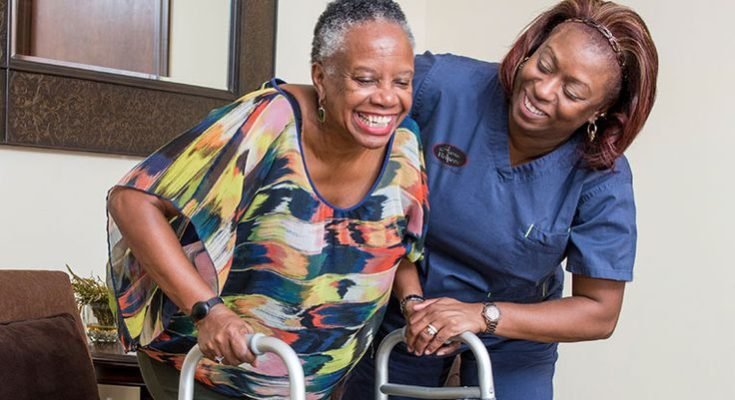The demand for skilled caregivers in the USA is growing rapidly, creating excellent opportunities for foreign workers seeking employment with visa sponsorship. If you have a passion for providing care and support to seniors, individuals with disabilities, or those in need of home assistance, you could secure a caregiver job in the USA with visa sponsorship—and earn up to $75,000 annually.
Table of Contents
What Is U.S. Visa Sponsorship?
Read Also: Get CBN TIES Loan ₦500,000 to ₦5 million Loan
U.S. visa sponsorship is a legal process that allows a foreign national to enter, reside, and work in the United States under the sponsorship of a U.S.-based employer, educational institution, or family member. The sponsoring entity assumes legal responsibility for the applicant, ensuring compliance with immigration laws and proving that the foreign national will not become a financial burden on the U.S. government.
Why Choose Caregiver Jobs in the USA?
Care-giving is a noble profession that plays a vital role in supporting individuals who need assistance due to age, illness, or disability. Here’s why caregiver jobs in the USA are an excellent career choice:
- High Demand: The aging population in the USA has created a growing need for skilled caregivers. According to the U.S. Bureau of Labor Statistics, employment in healthcare support occupations is projected to grow significantly in the coming years.
- Competitive Salaries: Caregiver jobs offer attractive salaries, with many positions paying up to $75,000 annually, depending on experience and location.
- Visa Sponsorship: Many employers are willing to sponsor visas for qualified international candidates, making it easier to work legally in the USA.
- Job Satisfaction: Caregiving is a fulfilling career that allows you to make a positive difference in the lives of others.
Types of Caregiver Jobs Available in the USA
If you’re considering a career as a caregiver in the USA, it’s important to understand the different types of roles available. Caregiver jobs vary depending on the level of care required, the setting, and the specific needs of patients. Many of these positions also offer visa sponsorship, making them accessible to international candidates. Here’s a breakdown of the most common caregiver jobs:
1. Home Health Aides (HHA)
Home Health Aides (HHAs) provide essential in-home care to patients who need assistance with daily living activities. Their responsibilities include:
- Helping with personal hygiene tasks like bathing, dressing, and grooming.
- Preparing meals and assisting with feeding.
- Performing light housekeeping duties, such as laundry and cleaning.
- Offering companionship and emotional support.
HHAs play a vital role in enabling patients to live comfortably in their own homes.
Average Salary: 25,000−35,000 annually.
2. Certified Nursing Assistants (CNA)
Certified Nursing Assistants (CNAs) work under the supervision of registered nurses (RNs) or licensed practical nurses (LPNs) to provide basic healthcare services. Their duties include:
- Assisting patients with mobility, such as walking or transferring from beds to wheelchairs.
- Monitoring vital signs like blood pressure and temperature.
- Helping with medical procedures, such as wound care or catheter maintenance.
- Providing emotional support to patients and their families.
CNAs are often employed in hospitals, nursing homes, and assisted living facilities.
Average Salary: 30,000−40,000 annually.
3. Personal Care Assistants (PCA)
Personal Care Assistants (PCAs) focus on non-medical support, helping patients with everyday tasks and improving their quality of life. Their responsibilities include:
- Assisting with grooming, dressing, and meal preparation.
- Providing companionship and engaging patients in social activities.
- Helping with light housekeeping and errands.
- Offering transportation to appointments or social outings.
PCAs are ideal for individuals who enjoy building personal connections with patients.
Average Salary: 20,000−30,000 annually.
4. Live-in Caregivers
Live-in caregivers reside with their patients to provide round-the-clock care and support. This role is ideal for patients who require constant assistance due to age, illness, or disability. Responsibilities include:
- Providing 24/7 care, including assistance with daily activities and medical needs.
- Monitoring patients’ health and reporting any changes to healthcare professionals.
- Offering companionship and emotional support.
- Managing household tasks like cooking, cleaning, and grocery shopping.
- Live-in caregivers often work with elderly patients or those with severe medical conditions.
Average Salary: 35,000−,000 annually.
5. Special Needs Caregivers
Special needs caregivers work with individuals who have disabilities or chronic illnesses, helping them lead fulfilling lives. Their duties include:
- Assisting with daily living activities tailored to the patient’s specific needs.
- Providing emotional and behavioral support.
- Helping patients develop life skills and independence.
- Coordinating with therapists, doctors, and family members to ensure comprehensive care.
This role requires patience, empathy, and specialized training to address the unique challenges faced by individuals with special needs.
Average Salary: 30,000−45,000 annually.
Requirements for Caregiver Jobs in the USA
1. Educational Requirements
While some caregiver roles require minimal formal education, others may need specific certifications or degrees. Here’s what you’ll typically need:
- High School Diploma or Equivalent: Most entry-level caregiver positions, such as Home Health Aides (HHAs) or Personal Care Assistants (PCAs), require at least a high school diploma or GED.
- Certifications: Roles like Certified Nursing Assistants (CNAs) require state-approved training programs and certification. Similarly, HHAs may need to complete a training program and pass a competency exam.
- Advanced Degrees: For higher-level positions like Licensed Practical Nurses (LPNs) or Registered Nurses (RNs), you’ll need a nursing degree and a valid license.
2. Training and Experience
Caregiver jobs often require hands-on training and experience. Here’s what employers typically look for:
- On-the-Job Training: Many employers provide training for entry-level roles, but prior experience in caregiving or healthcare is a plus.
- Clinical Experience: For CNAs, LPNs, and RNs, clinical training through accredited programs is essential.
- Specialized Skills: Experience with specific populations, such as elderly patients, individuals with disabilities, or those with chronic illnesses, can make you a more competitive candidate.
3. Certifications and Licenses
Certifications and licenses are often required for caregiver roles. Here are the most common ones:
- CNA Certification: Required for Certified Nursing Assistants, this involves completing a state-approved training program and passing a competency exam.
- HHA Certification: Home Health Aides may need to complete a training program and pass a certification exam, depending on the state.
- Nursing Licenses: LPNs and RNs must pass the NCLEX-PN or NCLEX-RN exams to obtain their licenses.
- CPR and First Aid Certification: Many employers require caregivers to be certified in CPR and first aid.
4. Skills and Qualities
Caregiver jobs require a unique combination of skills and personal qualities. Employers look for candidates who possess:
- Compassion and Empathy: The ability to connect with patients and provide emotional support is crucial.
- Patience: Caregiving can be challenging, and patience is essential when working with individuals who need extra time and attention.
- Communication Skills: Clear and effective communication is key to understanding patients’ needs and coordinating with healthcare teams.
- Physical Stamina: Caregivers often assist with lifting, moving, and supporting patients, so physical fitness is important.
- Attention to Detail: Monitoring patients’ health and administering medications require precision and attention to detail.
5. Legal and Visa Requirements for International Candidates
If you’re an international candidate seeking caregiver jobs in the USA, you’ll need to meet additional requirements:
- Work Visa: Secure a valid work visa, such as the H-1B, EB-3, J-1, or TN visa, depending on your qualifications and job offer.
- English Proficiency: Strong English language skills are essential for communicating with patients and healthcare teams.
- Background Check: Many employers require a clean criminal background check.
- Health Screening: Some positions may require a health screening or proof of vaccinations.
6. Additional Requirements for Visa Sponsorship
If you’re applying for a caregiver job with visa sponsorship, you’ll need to:
- Provide Proof of Qualifications: Submit copies of your certifications, degrees, and licenses.
- Obtain a Job Offer: Secure a job offer from a U.S. employer willing to sponsor your visa.
- Prepare for the Visa Process: Gather required documents, such as your passport, job offer letter, and proof of financial stability.
Visa Sponsorship for Caregiver Jobs in the USA
One of the biggest challenges for international candidates pursuing caregiver jobs in the USA is securing a work visa. Fortunately, many employers are willing to sponsor visas for qualified caregivers, making it easier to work legally in the country. Here’s an overview of the visa options available for caregivers:
- H-1B Visa: The H-1B visa is designed for skilled workers in specialized occupations. While it’s more commonly used for tech jobs, some healthcare roles, including certain caregiver positions, may qualify. To be eligible, you’ll need a job offer from a U.S. employer and a relevant degree or equivalent experience.
- EB-3 Visa: The EB-3 visa is an employment-based green card for skilled workers, professionals, and other workers. It’s a popular option for caregivers, especially Certified Nursing Assistants (CNAs) and Registered Nurses (RNs). To qualify, you’ll need a permanent job offer from a U.S. employer and proof of your qualifications.
- J-1 Visa: The J-1 visa is for exchange visitors participating in work-and-study-based exchange programs. Some caregiver jobs, particularly those tied to training or cultural exchange programs, may qualify under this category. To apply, you’ll need to participate in an approved exchange program.
- TN Visa: The TN visa is available to Canadian and Mexican citizens under the USMCA (United States-Mexico-Canada Agreement). It’s a great option for caregivers from these countries who have a valid job offer from a U.S. employer.
States with High Demand for Caregivers
Some states in the USA have a particularly high demand for caregivers due to their large elderly populations and a shortage of healthcare professionals. Targeting these states may improve your chances of securing a job with visa sponsorship:
- California: Cities like Los Angeles, San Francisco, and San Diego have high job openings for caregivers.
- Texas: Houston, Dallas, and Austin are hotspots for caregiver jobs.
- Florida: Miami, Orlando, and Tampa have a significant demand for caregivers.
- New York: New York City, Buffalo, and Rochester offer numerous opportunities.
- Pennsylvania: Philadelphia, Pittsburgh, and Harrisburg have a steady demand for caregivers.
How to Find Caregiver Jobs with Visa Sponsorship
Finding caregiver jobs in the USA with visa sponsorship requires a strategic approach. Here are some tips to help you get started:
- Use Job Search Websites: Websites like Indeed, Glassdoor, and LinkedIn often list caregiver jobs with visa sponsorship. Use filters to narrow down your search.
- Check Healthcare Recruitment Agencies: Many recruitment agencies specialize in placing international candidates in healthcare roles. Examples include AMN Healthcare and Cross Country Healthcare.
- Network with Professionals:Join online forums, attend healthcare conferences, and connect with professionals in the industry to learn about job opportunities.
- Apply Directly to Care Facilities:Research care homes and healthcare agencies in the USA and visit their websites to check for job openings.
- Prepare a Strong Application:Tailor your resume and cover letter to highlight your caregiving experience, qualifications, and willingness to relocate.
How to Apply for Caregiver Jobs in the USA with Visa Sponsorship
Follow these steps to secure a caregiver job in the USA with visa sponsorship:
- Update Your Resume – Highlight caregiving experience, certifications (e.g., CNA, HHA), and language skills.
- Get Certified – Many states require caregivers to complete training and obtain certification.
- Search for Sponsored Jobs – Look for employers willing to sponsor visas on platforms like:
- Apply to Employers Directly – Nursing homes, home care agencies, and private families often sponsor foreign caregivers.
- Prepare for Interviews – Be ready to discuss your caregiving experience and ability to relocate.
Tips for Success in Caregiver Jobs
To thrive in a caregiver job, consider the following tips:
- Develop Strong Communication Skills: Effective communication is essential for building trust with patients and their families.
- Be Compassionate and Patient: Caregiving can be emotionally challenging, so it’s important to approach your work with empathy and patience.
- Stay Organized:Managing multiple tasks and responsibilities requires excellent organizational skills.
- Continue Learning: Pursue additional training and certifications to enhance your skills and advance your career.
Navigating Life in the USA
Adjusting to life in a new country can be exciting yet challenging. Here are key aspects to consider as a caregiver moving to the USA:
1. Housing Options
- Many live-in caregivers receive free accommodation. If not, explore affordable housing near your workplace.
- Websites like Zillow, Craigslist, and Apartments.com help find rentals.
2. Cost of Living
- The cost of living varies by state. Cities like New York and Los Angeles are expensive, while Texas and Florida offer more affordable living.
- Budget wisely, considering housing, transportation, food, and healthcare.
3. Transportation
- Some caregivers receive transportation benefits from their employers.
- Public transit options vary by city. In places like New York or Chicago, subways and buses are reliable, while in rural areas, a car may be necessary.
4. Healthcare and Insurance
- Some employers provide health insurance, but if not, check the Affordable Care Act (ACA) marketplace for options.
- Familiarize yourself with the U.S. healthcare system and find local clinics for check-ups.
5. Cultural Adaptation
- The USA is diverse, so expect to meet people from different backgrounds.
- Improve your English skills if needed through online courses or local ESL (English as a Second Language) classes.
6. Legal Requirements & Taxes
- Understand your visa conditions, renewal dates, and work permit limitations.
- Caregivers must pay income tax, and some employers deduct it automatically from paychecks.
7. Legal Assistance: Immigration and Accident Lawyers
Having access to legal support is crucial for a smooth transition to life in the USA. Here are two key types of lawyers that caregivers should consider:
Immigration Lawyers
- Assist with visa applications, extensions, and green card processes.
- Help in case of work visa issues or sponsorship disputes.
- Provide legal representation if faced with deportation or status violations.
- Websites like AILA.org (American Immigration Lawyers Association) can help find qualified immigration attorneys.
Accident Lawyers
- If you experience a work-related injury or car accident, an accident lawyer can help with claims.
- They ensure you receive compensation for medical bills and lost wages.
- Many law firms offer free consultations, so it’s good to have a lawyer’s contact in case of emergencies.
- Platforms like FindLaw and Avvo can help locate reliable legal professionals.
Conclusion
Caregiver jobs in the USA offer a unique opportunity to build a rewarding career while making a positive impact on the lives of others. With competitive salaries, high demand, and visa sponsorship opportunities, these roles are an excellent choice for international candidates.
By following the steps outlined in this guide, you can increase your chances of landing a caregiver job in the USA and achieving your career goals. Start your journey today and take the first step toward a fulfilling and prosperous future in caregiving!



